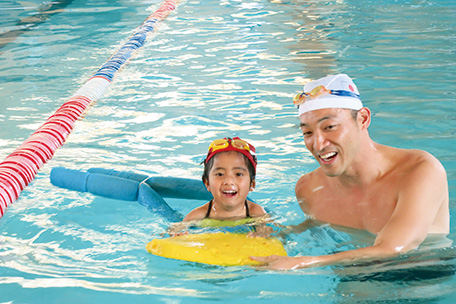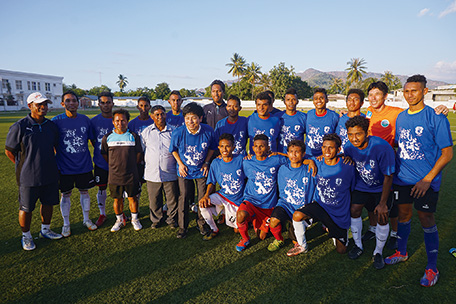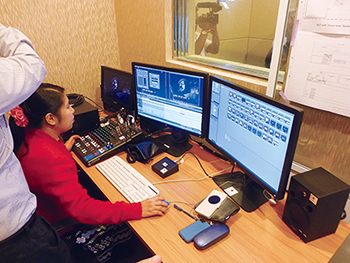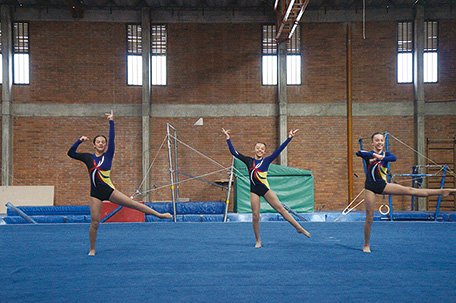(6) Culture and Sports
In developing countries, there is a growing interest in the preservation and promotion of their own cultures. Cultural heritages that symbolize countries are not only sources of pride for their people, but are also resources that can be effectively utilized for tourism to develop the socio-economic environment of the people in surrounding areas. On the other hand, many cultural heritages in developing countries are exposed to dangers in terms of preservation and maintenance.
Assistance to protect cultural heritage is a form of cooperation that directly reaches the hearts of the people in those countries, and has long-term impacts. In addition, the preservation and promotion of culture, such as invaluable cultural heritage that is shared by all humankind, is an issue that should be addressed not only by the countries with cultural heritage in danger, but also by the entire international community.
Sports are popular with everyone, and anyone can easily take part in them regardless of their gender or age. Sports can enhance people’s quality of life through maintenance and improvement of health. Furthermore, sports foster respect for opponents and cultivate a spirit of mutual understanding and awareness of norms, through competing in accordance with fair rules and sharing the same experience. The influence and positive power of sports play the role of “catalyzing” the development and growth of developing countries.
< Japan’s Efforts >
Japan has contributed to the promotion of culture and higher education as well as preservation of cultural heritage in developing countries through Cultural Grant Assistance* since 1975. Specifically, Japan has constructed facilities necessary for preserving and utilizing cultural heritage and cultural properties, sports and cultural facilities, and facilities of higher education and research institutions in developing countries. Japan has also provided the necessary equipment for these facilities. Those facilities built in developing countries serve as centers for providing information about Japan and for cultural exchanges with Japan, as well as for deepening understanding of Japan and fostering a sense of affinity towards Japan. In recent years, from the viewpoint of “Japan Promotion,” Japan has also emphasized support for Japanese language education and support that contributes to disseminating Japanese contents.
In FY2014, Japan proactively provided sports assistance using ODA to advance Sport for Tomorrow, a programme of international contribution through sports by which Japan expands sporting values and the Olympic and Paralympic movement as the host country of the 2020 Olympic and Paralympic Games in Tokyo. Japan also provided other wide-ranging assistance, including assistance for the preservation of cultural heritage and assistance utilizing Japanese contents. In the area of sports assistance, Japan utilized Grant Assistance for Cultural Grassroots Projects to provide sports facilities and equipment to 12 countries, and dispatched 258 JICA volunteers in sports fields. Japan has also decided to utilize the Grant Assistance for Cultural Grassroots Projects to assist with the preservation of cultural heritage, such as the projects for the improvement of equipment for preserving the collection of the National Museum of Mongolia and promoting culture in Old Havana in Cuba. In addition to the above, Japan provides Japanese documentations and educational TV programs in four countries.

A Japan Overseas Cooperation Volunteer, Mr. Osamu Itoi has joined the swimming federation of the Chimborazo Province in central Ecuador and provides swimming lessons to young children. (Photo: Patty Siza)

Then Parliamentary Vice-Minister for Foreign Affairs Kazuyuki Nakane (front) observes a practice session of the National U19 Soccer Team of East Timor in July 2015.

Equipment provided under the Project for the Improvement of TV Programs and Broadcast Editing Equipment of Myanma Radio and Television (MRTV) is used to input and edit subtitles for Japanese TV Programs. (Photo: Embassy of Japan in Myanmar)
Japan contributes to the restoration and preservation of cultural heritage, including equipment provision and preliminary studies and surveys, through the Japanese Funds-in-Trust for the Preservation of the World Cultural Heritage established in UNESCO. Placing a particular emphasis on human resources development in developing countries, Japan also provides assistance by dispatching international experts, which mainly include Japanese experts, and holding workshops in order to transfer techniques and knowledge to developing countries. Japan furthermore supports the safeguarding of intangible cultural heritage such as traditional dances, music, handcraft techniques, and oral traditions by implementing projects of successor training, records conservation, creation of safeguarding mechanisms, and other activities through the Japanese Funds-in-Trust for the Safeguarding of the Intangible Cultural Heritage established in UNESCO.
The Ministry of Education, Culture, Sports, Science and Technology (MEXT) implements the Cooperation Promotion Program for the Protection of World Heritage and Other Cultural Properties in the Asia-Pacific Region, in which it invites young experts on cultural heritage protection from the Asia-Pacific region to Japan for training.
- *Cultural Grant Assistance
- Cultural Grant Assistance provides funding to procure equipment and supplies, and improve facilities for the promotion of culture and higher education in developing countries. It is intended to encourage cultural and educational advancements in these countries as well as cultural exchanges between Japan and the countries, with a view to deepening friendships and mutual understanding. Cultural Grant Assistance includes General Cultural Grant Assistance, which provides assistance to governmental organizations, and Grant Assistance for Cultural Grassroots Projects, which provides assistance to NGOs and local public entities for small-scale projects.
Colombia
Project for Improvement of Cayetano Cañizares Gymnasium Facilities
Grant Assistance for Cultural Grassroots Projects (February 2015 – July 2015)

Performance by members of the gymnastics club at the equipment hand-over ceremony. (Photo: Embassy of Japan in Colombia)
Colombia is known as a soccer powerhouse and its national team appeared in the 2014 World Cup in Brazil, where it faced off against Japan. In order to raise the quality of life of its citizens, Colombia is working to strengthen all sports. Efforts led by the Colombian Gymnastics Federation are also being made throughout the country to promote and improve the level of gymnastics. Given the high level of gymnastics in Japan, there are three Japanese gymnastics coaches currently working in Colombia.
However, Colombia’s budget for sports is limited and practice facilities are not fully equipped. For example, many gymnasts suffered sprains or broken bones during practice at Cayetano Cañizares Gymnasium in Bogota D.C. This was because the facility had not been able to replace its old spring floor. Gymnasts were therefore not able to sufficiently absorb the impact to their bodies. Then, the Government of Japan provided a brand new spring floor for the gymnasium under the framework of Grant Assistance for Cultural Grassroots Projects.
As a result, 500 people are now able to use this gymnastic facility for training or classes. They are now able to practice in a safe environment without suffering excessive strain on their lower backs. A number of highly promising gymnasts currently train at the gymnasium day and night. They are expected to represent Colombia and compete at the 2020 Olympic and Paralympic Games in Tokyo.
